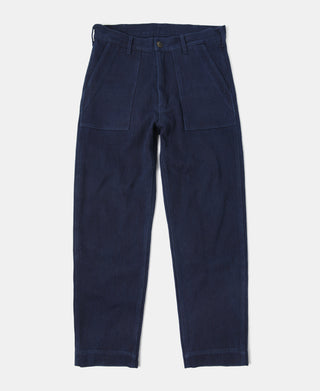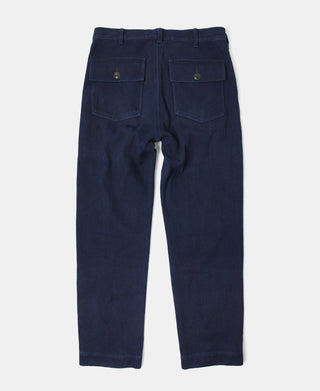OG-107 Fatigue Pants - Indigo-Dyed Sashiko Version
- Unit price
- /per
Free Shipping over £79 + 30-day Returns.
Model
- 5' 10"/ 159lbs, 178cm/ 72.5kg, size M.
Pairs well with
Adding product to your cart
-
Inspired by US Army OG-107 Fatigue Pants. Made with sashiko cotton with a texturized, woven handle, heavyweight 450 GSM. Hand-dyed using natural indigo and washed. Classic fit with a straight leg, and the signature 'Baker Pants' patch pockets on the front, as well as two back buttoned pockets.
US Army OG-107 Fatigue Pants were originally designed as part of the US military's OG-107 uniform (OG stood for olive green) back in 1952, fatigue pants as they've come to be known, or Baker Pants, evolved out of the 'HBT' herringbone twill pants worn during WW2. -
**Model - 5' 10"/ 159lbs, 178cm/ 72.5kg, size M.**
Please use this info as a general guide as measurements are approximate.
Size Waist Hip S/W30 30.7" / 78 cm 38.6" / 98 cm M/W32 32.3" / 82 cm 40.2" / 102 cm L/W34 33.9" / 86 cm 41.7" / 106 cm XL/W36 35.4" / 90 cm 43.3" / 110 cm XXL/W38 37.0" / 94 cm 44.9" / 114 cm
Size Front Rise Back Rise S/W30 12.4" / 31.5 cm 16.9" / 43 cm M/W32 12.6" / 32 cm 16.9" / 43 cm L/W34
12.8" / 32.5 cm 17.7" / 45 cm XL/W36 12.8" / 32.5 cm 17.7" / 45 cm XXL/W38 13.6" / 34.5 cm 17.9" / 45.5 cm
Size Thigh Inseam
S/W30 22.8" / 58 cm
28.3" / 72 cm M/W32 23.6" / 60 cm 28.7" / 73 cm L/W34
24.4" / 62 cm 28.7" / 73 cm XL/W36 25.2" / 64 cm 28.9" / 73.5 cm XXL/W38 26" / 66 cm 28.9" / 73.5 cm
Size Length Leg Opening S/W30 40.2" / 102 cm 7.1" / 18 cm M/W32 40.9" / 104 cm 7.5" / 19 cm L/W34
41.7" / 106 cm 7.9" / 20 cm XL/W36 42.5" / 108 cm 8.3" / 21 cm XXL/W38 43.3" / 110 cm 8.7" / 22 cm In order to best determine fit, it may be helpful to compare our garment’s measurements to a similar garment you already own. Lay your garment on a flat surface and take all measurements from the outside of the garment.
Click here to check out our Garment Measuring Guide.
** If you are still confused, you can Contact Us to help you choose the size. **
-
- Classic fit with a straight leg.
- Belt loops. Zipper fly with a buttoned closure. Genuine horn buttons.
- Two front angled patch pockets. Two back patch pockets.
- 450 GSM sashiko cotton, 100% cotton.
- Machine washable.
- Dyed with indigo, which may rub off onto fabrics, leather, and upholstery.
-
- Machine washable.
- Dyed with indigo, which may rub off onto fabrics, leather, and upholstery.
Inspired by US Army OG-107 Fatigue Pants. Made with sashiko cotton with a texturized, woven handle, heavyweight 450 GSM. Hand-dyed using natural indigo and washed. Classic fit with a straight leg, and the signature 'Baker Pants' patch pockets on the front, as well as two back buttoned pockets.
US Army OG-107 Fatigue Pants were originally designed as part of the US military's OG-107 uniform (OG stood for olive green) back in 1952, fatigue pants as they've come to be known, or Baker Pants, evolved out of the 'HBT' herringbone twill pants worn during WW2.
**Model - 5' 10"/ 159lbs, 178cm/ 72.5kg, size M.**
Please use this info as a general guide as measurements are approximate.
| Size | Waist | Hip |
| S/W30 | 30.7" / 78 cm | 38.6" / 98 cm |
| M/W32 | 32.3" / 82 cm | 40.2" / 102 cm |
| L/W34 | 33.9" / 86 cm | 41.7" / 106 cm |
| XL/W36 | 35.4" / 90 cm | 43.3" / 110 cm |
| XXL/W38 | 37.0" / 94 cm | 44.9" / 114 cm |
| Size | Front Rise | Back Rise |
| S/W30 | 12.4" / 31.5 cm | 16.9" / 43 cm |
| M/W32 | 12.6" / 32 cm | 16.9" / 43 cm |
| L/W34 |
12.8" / 32.5 cm | 17.7" / 45 cm |
| XL/W36 | 12.8" / 32.5 cm | 17.7" / 45 cm |
| XXL/W38 | 13.6" / 34.5 cm | 17.9" / 45.5 cm |
| Size | Thigh | Inseam |
| S/W30 | 22.8" / 58 cm |
28.3" / 72 cm |
| M/W32 | 23.6" / 60 cm | 28.7" / 73 cm |
| L/W34 |
24.4" / 62 cm | 28.7" / 73 cm |
| XL/W36 | 25.2" / 64 cm | 28.9" / 73.5 cm |
| XXL/W38 | 26" / 66 cm | 28.9" / 73.5 cm |
| Size | Length | Leg Opening |
| S/W30 | 40.2" / 102 cm | 7.1" / 18 cm |
| M/W32 | 40.9" / 104 cm | 7.5" / 19 cm |
| L/W34 |
41.7" / 106 cm | 7.9" / 20 cm |
| XL/W36 | 42.5" / 108 cm | 8.3" / 21 cm |
| XXL/W38 | 43.3" / 110 cm | 8.7" / 22 cm |
In order to best determine fit, it may be helpful to compare our garment’s measurements to a similar garment you already own. Lay your garment on a flat surface and take all measurements from the outside of the garment.
Click here to check out our Garment Measuring Guide.
** If you are still confused, you can Contact Us to help you choose the size. **
- Classic fit with a straight leg.
- Belt loops. Zipper fly with a buttoned closure. Genuine horn buttons.
- Two front angled patch pockets. Two back patch pockets.
- 450 GSM sashiko cotton, 100% cotton.
- Machine washable.
- Dyed with indigo, which may rub off onto fabrics, leather, and upholstery.
- Machine washable.
- Dyed with indigo, which may rub off onto fabrics, leather, and upholstery.

Sashiko (刺し子, lit. 'little stabs') is a type of traditional Japanese embroidery or stitching used for the decorative and/or functional reinforcement of cloth and clothing.
First coming into existence in the Edo period (1603–1867), sashiko embroidery was first applied to clothing out of a practical need and would have been used to strengthen the homespun clothes of olden times. Worn-out clothes were pieced together to make new garments by using simple running stitches. These clothes increased their strength with this durable embroidery. By the Meiji period (1868–1912), sashiko had been established enough to evolve into winter work in northern farming communities when it was too cold to work outside.
Sashiko was commonly used to reinforce already-patched clothing around points of wear, but it would also be used to attach patches to clothing, ultimately making the fabric stronger. It would also be used to layer thin fabrics to create warmth and, in the case of some garments such as the coats of firemen, to create a thick and absorbent material that would be soaked in water before carrying out duties as a fireman. Though most sashiko utilizes only a plain running stitch technique, sashiko is commonly used to create decorative and repeated embroidered patterns and may be used for purely decorative purposes, such as in the creation of quilts and embroidery samplers.
















